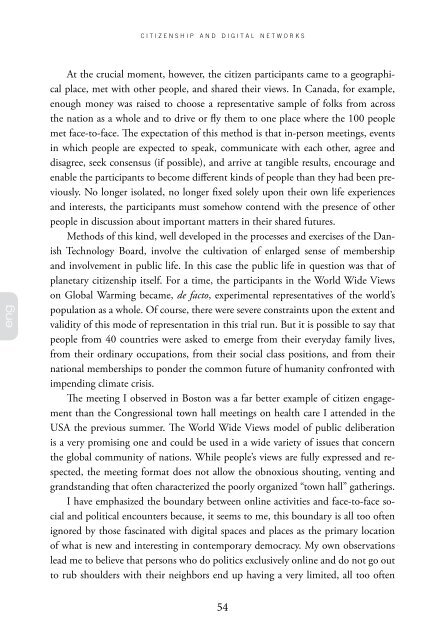Sergio Amadeu da Silveira - Cidadania e Redes Digitais
Sergio Amadeu da Silveira - Cidadania e Redes Digitais
Sergio Amadeu da Silveira - Cidadania e Redes Digitais
You also want an ePaper? Increase the reach of your titles
YUMPU automatically turns print PDFs into web optimized ePapers that Google loves.
eng<br />
c i t i z e n s h i p a n d d i g i t a l n e t w o r k s<br />
At the crucial moment, however, the citizen participants came to a geographical<br />
place, met with other people, and shared their views. In Cana<strong>da</strong>, for example,<br />
enough money was raised to choose a representative sample of folks from across<br />
the nation as a whole and to drive or fly them to one place where the 100 people<br />
met face-to-face. The expectation of this method is that in-person meetings, events<br />
in which people are expected to speak, communicate with each other, agree and<br />
disagree, seek consensus (if possible), and arrive at tangible results, encourage and<br />
enable the participants to become different kinds of people than they had been previously.<br />
No longer isolated, no longer fixed solely upon their own life experiences<br />
and interests, the participants must somehow contend with the presence of other<br />
people in discussion about important matters in their shared futures.<br />
Methods of this kind, well developed in the processes and exercises of the Danish<br />
Technology Board, involve the cultivation of enlarged sense of membership<br />
and involvement in public life. In this case the public life in question was that of<br />
planetary citizenship itself. For a time, the participants in the World Wide Views<br />
on Global Warming became, de facto, experimental representatives of the world’s<br />
population as a whole. Of course, there were severe constraints upon the extent and<br />
validity of this mode of representation in this trial run. But it is possible to say that<br />
people from 40 countries were asked to emerge from their every<strong>da</strong>y family lives,<br />
from their ordinary occupations, from their social class positions, and from their<br />
national memberships to ponder the common future of humanity confronted with<br />
impending climate crisis.<br />
The meeting I observed in Boston was a far better example of citizen engagement<br />
than the Congressional town hall meetings on health care I attended in the<br />
USA the previous summer. The World Wide Views model of public deliberation<br />
is a very promising one and could be used in a wide variety of issues that concern<br />
the global community of nations. While people’s views are fully expressed and respected,<br />
the meeting format does not allow the obnoxious shouting, venting and<br />
grandstanding that often characterized the poorly organized “town hall” gatherings.<br />
I have emphasized the boun<strong>da</strong>ry between online activities and face-to-face social<br />
and political encounters because, it seems to me, this boun<strong>da</strong>ry is all too often<br />
ignored by those fascinated with digital spaces and places as the primary location<br />
of what is new and interesting in contemporary democracy. My own observations<br />
lead me to believe that persons who do politics exclusively online and do not go out<br />
to rub shoulders with their neighbors end up having a very limited, all too often<br />
54


